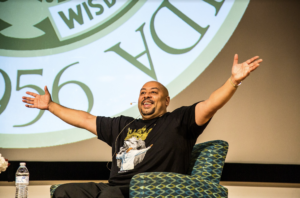‘The system itself wants you to occupy a jail cell and not a college dorm’

After serving nearly six years in prison for a crime he was wrongly convicted of, Raymond Santana had to learn to cope with the injustices thrown at him throughout his life.
The clothing designer and social activist shared with the University Lecture Series audience Tuesday night how he was able to turn his resentment for what happened to him into creativity.
The Marshall Student Center Oval Theater was packed with students, faculty and the Tampa community eager to hear the Central Park Five exoneree talk about his life experiences.
Santana did in fact share details about his life after the 1989 Central Park jogger case. But he also encouraged students throughout the moderated lecture to speak up for social justice reform and to have power over their education.
“In order to win the battle against the system, you have to start playing chess and not checkers because the system moves three steps ahead,” Santana said. “That’s why I talk to young people, I know that you guys can make the change.”
Santana told the room of about 400 people that just by attending a university, they were “beating the odds.” Since he was a 14-year-old when he was convicted, Santana had to earn his GED and an associate’s degree in prison.
Santana admitted that he didn’t take college seriously at first, which caused him to be on academic probation after his first semester.
However, after realizing the importance of education, Santana was able to understand the logistics of his case.
“The system itself wants you to occupy a jail cell and not a college dorm and it doesn’t matter the complexion you are or your nationality because it’s all about the money,” Santana said.
Santana was selected at random, along with the four other men, the night of the Central Park rape case because of his race. After the offender of the crime came forward, Santana was exonerated in 2002. The group was later renamed the Exonerated Five.
In regards to the attention, When They See Us, has received, Santana said he is appreciative that a new generation of people are able to identify with his story. The Netflix mini-series was released in May and recounts the story of the Exonerated Five as a drama.
“It’s still happening today,” Santana said. “We see the Trayvon Martins, the Michael Browns — it is all still relevant. Our goal is to not have another Central Park Five story, even though we know it’s possible.”
As the first person to be released from prison from the group, Santana said he was faced with a level three sex offender charge, a strict curfew and the eyes of the whole nation waiting for him to fail.
He called it a “social death.”
“We were considered the most hated human beings on planet earth in 1989,” Santana said. “Even at my own doorstep, my stepmom thought I was guilty.
“I felt like I had to walk on eggshells.”
Post-exoneration, Santana said he was eventually able to learn how to channel his energy into something more positive — fashion design. Many of his friends were surprised that he wanted to pursue this, but he said this was something he has wanted to do since he was a child.
“I wanted to reclaim something that I lost,” Santana said.
Thus the Park Madison NYC was born.
The most popular shirt design is the first names of the Exonerated Five. Santana said this was the perfect design to pay homage to his past while still living his dream.
“The shirt became a symbol — simple, yet effective,” Santana said. “ … It was a way to bring tribute to little Raymond.”
In addition to his clothing brand, Santana partnered with the Innocence Project to pass legislation that says police have to record the entire interrogation process.
This is to prevent the police from using coercion to falsely convict people, which is what happened to the Exonerated Five.
Thirty years later, Santana said he wouldn’t change what happened to him because it gave him the platform to speak up about criminal justice reform and a voice to young people.
“I didn’t ask for this life narrative, it was given to me and I accepted it,” Santana said. “As I started to figure out the system, I realized I had a duty and I needed to fill it.
“The purpose is bigger than just me, it’s about you guys.”







